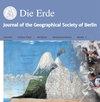南北价值链的正规化与非正规化悖论
IF 0.6
4区 地球科学
Q3 GEOGRAPHY
引用次数: 4
摘要
价值链的国际化和不同的公共和私人标准的广泛扩散导致了价值链、生产系统及其宪法行为者和联系在全球南方的正规化和标准化。然而,最近关于南方生产系统融入国际价值链的研究表明,情况只是部分如此。这些研究确定了正式和标准化协调和控制系统的局限性和不足之处,以及协调北方领导公司对南方内部利益攸关方的区域特点、个人目标和能力的忽视。因此,非正式的演员和安排继续成为,甚至继续发展成为南方生产系统的重要部分。参考非正式概念、委托代理理论和约定理论,本研究旨在为最近关于全球价值链和全球生产网络的概念辩论做出贡献,概述非正式安排和非工业约定的重要性以及南北关系升级的限制。经验基础是对肯尼亚(园艺)、孟加拉国(虾)和印度/孟加拉国(皮革)面向出口的初级生产系统的个案研究。本文章由计算机程序翻译,如有差异,请以英文原文为准。
The paradox of formalization and informalization in South-North value chains
The internationalization of value chains and the broad proliferation of different public and private standards have led to a formalization and standardization of value chains, production systems and their constitutional actors and linkages in the Global South. Recent studies on the integration of Southern production systems in international value chains, however, show that this is only partly the case. These studies identify limits and insufficiencies of formal and standardized coordination and control systems as well as a neglect of regional peculiarities, individual aims and capabilities of the embedded stakeholders in the South by the coordinating lead firms from the North. As a result, informal actors and arrangements continue to be, and even continue to develop as, important parts of Southern production systems. With reference to the concept of informality, principal-agent theory and convention theory, this study aims to contribute to the recent conceptual debate on global value chains and global production networks in outlining the importance of informal arrangements and non-industrial conventions as well as the limits to upgrading in South-North relationships. The empirical base are case studies on export-oriented primary production systems in Kenya (horticulture), Bangladesh (shrimps) and India/Bangladesh (leather).
求助全文
通过发布文献求助,成功后即可免费获取论文全文。
去求助
来源期刊

Erde
GEOGRAPHY, PHYSICAL-GEOSCIENCES, MULTIDISCIPLINARY
CiteScore
2.90
自引率
6.20%
发文量
0
审稿时长
>12 weeks
期刊介绍:
DIE ERDE is a publication of the Geographical Society of Berlin
DIE ERDE is a scientific journal in Geography, with four issues per year with about 100 pages each. It covers all aspects of geographical research, focusing on both earth system studies and regional contributions.
DIE ERDE invites contributions from any subfield of both Physical and Human Geography as well as from neighbouring disciplines.
 求助内容:
求助内容: 应助结果提醒方式:
应助结果提醒方式:


